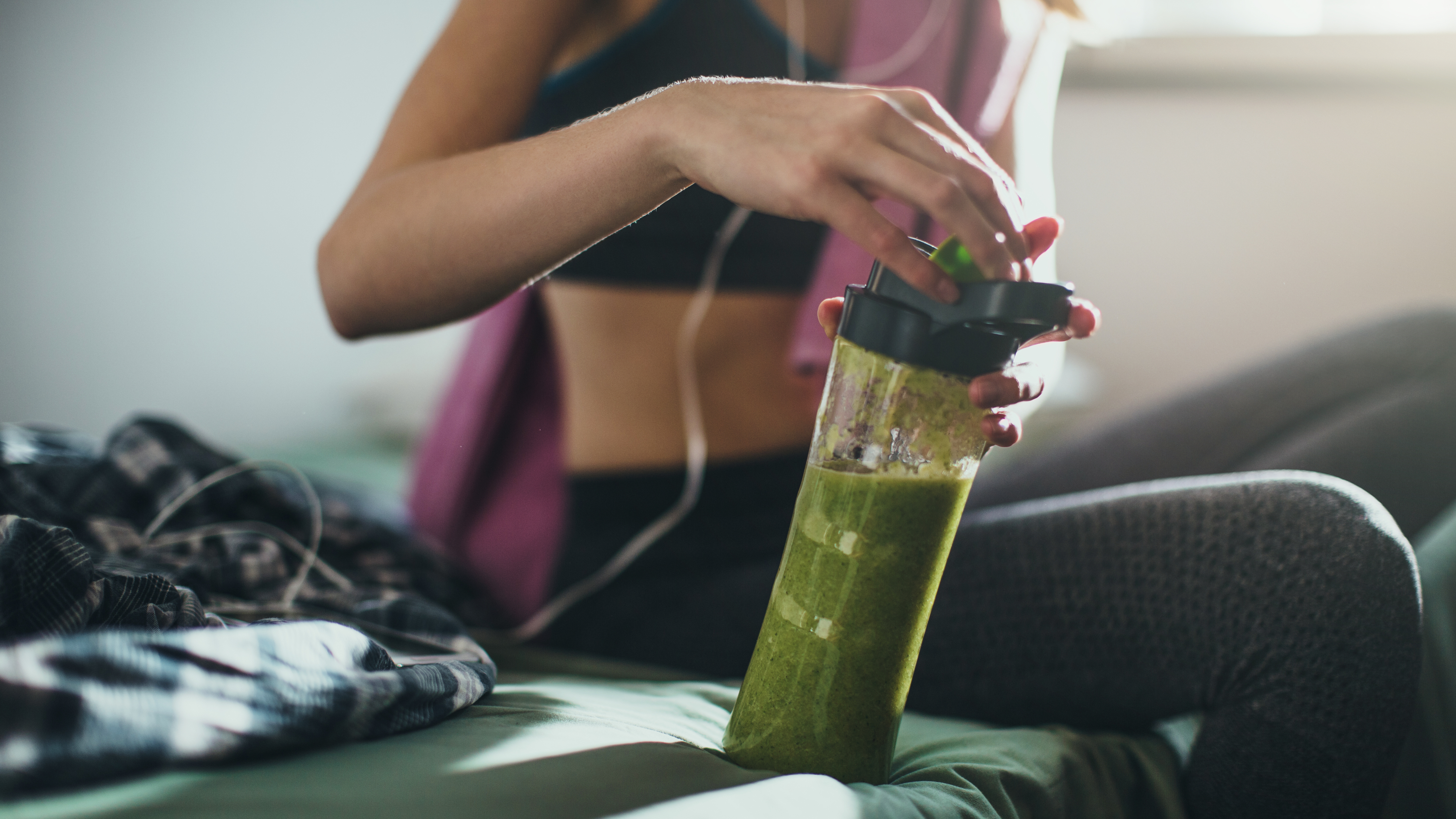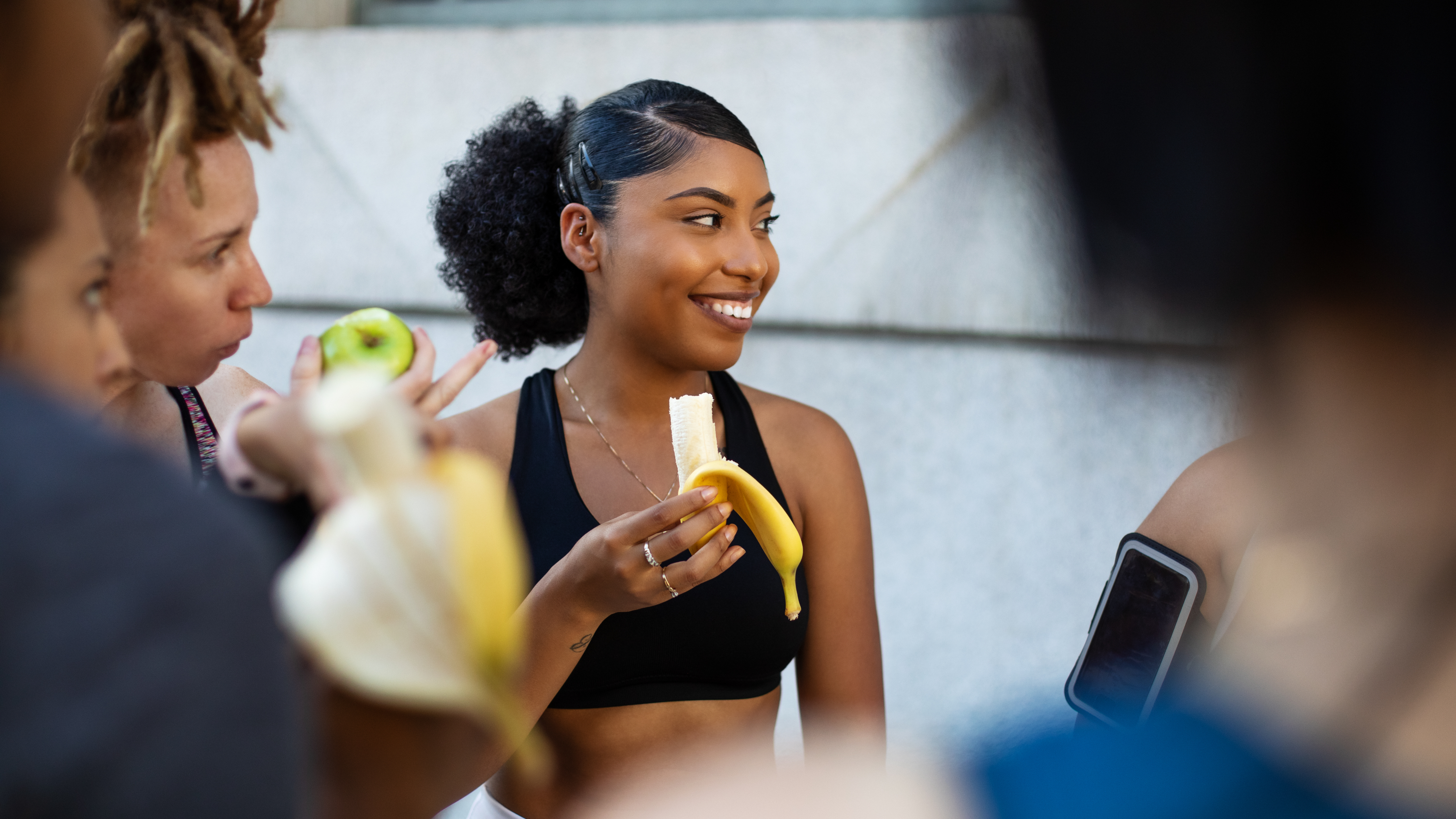Should you work out on an empty stomach? Here’s the deal when it comes to fat loss
Fasted exercise is a popular fitness trend, but should you actually work out on an empty stomach?

For those partial to an a.m. training session, whether to work out on an empty stomach is likely to be a frequent conundrum. Eat beforehand and risk nausea during those jump squats? Or go without and suffer hunger and fatigue as you attempt to power through those final treadmill sprints?
Throw in the fact that, in recent years, there's been a burgeoning trend within the fitness world for 'fasted' exercise—that’s working out having completely digested and absorbed your last meal or snack. Because this usually means three or four hours after a person last eats, it primarily tends to apply to morning training sessions that take place before breakfast.
Its popularity has been fuelled by some research showing that shunning pre-workout sustenance can actually help you achieve your fitness goals—including supercharging fat loss and honing strength (perhaps with one of these best resistance bands for women, just saying). However, other studies have suggested that it doesn’t make any difference. Read on for our bite-sized (sorry...) expert-led breakdown of what’s going on if you do or don’t eat before breaking a sweat...
- Diet vs. exercise: which is most important when you’re trying to lose weight?
- Resistance bands exercises: 7 moves to work your whole body
- What’s the perfect workout schedule? What do each week to stay in shape
Work out on an empty stomach? The expert take
1. Pro: Fat loss
Or at least, possibly, according to some research. For instance, one study conducted in 2010 found that working out in a 'fasted state' lead to greater fat burn than training after a meal.
"Essentially, when we exercise without having eaten, our body needs to find energy from other sources since it doesn’t have food to break down into the necessary components we need to create energy," says Chris Allsbrook, personal trainer at OriGym Centre of Excellence, of the theory.
Allsbrook continued: "The body utilizes stored fat deposits, breaking these down into the essential sugars that provide energy during exercise." He adds that this may ultimately help those who have the goal of healthy fat loss.
2. Con: Mixed results
If that sounds too good to be true—it just might. Allsbrook notes that scientific research remains divided on this topic. A 2014 study showed that working out on an empty stomach made no difference to body composition.
What’s more, the findings showing that 'fasted' exercise is beneficial may not even apply to everyone. "Research shows there are differences to how men and women react physiologically to exercising without food—while the former may benefit from training this way, all the evidence points to the fact that 'fueled' training is best for females when it comes to fitness gains," explains Suzie Richards, a former World Duathlon champion and professional triathlete who is now working as a mindset and performance coach.
"Additionally, getting into the habit of working out in the morning but not eating until later in the day may cause problems for women," Richard continues. "For example, with reproductive health, since a lack of food triggers the body to slow down, stopping the release of hormones from the endocrine system that are needed for regular menstrual cycles."

Beware: 'fasted' exercise side effects
Sure, you may wake up for a workout at the crack of dawn and not feel remotely hungry—but consider that failing to fuel your body could impact your performance. "From the perspective of a personal trainer, it’s always much better to train after you’ve eaten," says Allsbrook. "It provides crucial energy for the workout you’ll be undertaking. Plus, exercising on an empty stomach can cause dizziness, light-headedness, and nausea, leading to vomiting in the most extreme cases."
What's more, Allsbrook adds that because your blood sugar will be at a lower level than normal, you may also feel shaky or unstable, which could be dangerous if you are lifting weights or using machines.
And if you're feeling rubbish, you're not going to be able to give your all to your workout—potentially hampering your goals. "Many assume that eating before exercise will impede or stop the weight loss process altogether," notes Allsbrook. "But eating the right foods can actually promote healthy, sustainable results."
Consider: what type of workout?
However, the strenuousness of the exercise you're doing may impact whether you do or don't need to eat prior. “If you’re doing a Pilates or yoga class, or going out for a brisk walk, then you should be fine with little food in your system,” says Josh Davies, a personal trainer at Aimee Victoria Long. He adds that this is particularly the case if you ate a substantial amount fairly late the night before a low-impact, lower-intensity session.
On the other hand, David Wiener, a training specialist at fitness app Freeletics, says that for more challenging workouts it's advisable to fuel up. “If you are participating in an exercise that requires a lot of energy, strength, and endurance—such as weight training, HIIT, swimming, or tennis—you should ideally eat before as this will enable you to work harder and fatigue slower."

Pre-workout snacks: Fuel up on these foods...
Great stuff: you've decided to eat before you train. "I'd recommend a high-energy snack prior to exercising that contains slow-digesting carbohydrates, which will act as a continuous source of energy during the workout and also boost blood sugar levels," says Allsbrook, flagging fruit and vegetables—which are packed with healthy carbohydrates—as well as fiber-rich granola as his ideal pre-workout foods.
Dr. Emeka Okorocha, a medical doctor and Freeletics ambassador, also singles out bananas, oats, and chicken as smart choices. "Bananas are packed full of carbohydrates and potassium, while oats contain a high level of slow-release fiber and vitamin B, which helps to convert carbohydrates into energy," he explains.
"Lean protein such as grilled chicken helps build muscle mass." Other good options Dr. Okorocha recommends include a boiled egg with a slice of wholegrain bread, as well as Greek yogurt topped with fruit.
And finally, when to eat?
So, the experts agree that eating before you workout is ideal—but you still need to leave a gap of time. "Try to consume a snack 30 minutes before, or a meal 90 minutes, before you train," advises Dr. Okorocha, to ensure you're fueled but not uncomfortable.
And for those very early-morning starts? "You'd do best with a smoothie or shake so you're still energized, but you don't have anything sitting heavily on your stomach," suggests Dr. Giuseppe Aragona, GP and online doctor for Prescription Doctor. Now, what are you waiting for?
Lauren is a freelance writer and editor with more than six years of digital and magazine experience. Most recently, she has been the Acting Commissioning Editor of Women's Health—where she co-produced the Going For Goal podcast—and has previously also written news and features for titles including The Telegraph, Grazia, Stylist, Dazed, The Sun's Fabulous, Yahoo Style UK and Get The Gloss. She covers all aspects of lifestyle, specializing in health, beauty, and travel. Can't live without: oat milk lattes, new podcast episodes, long walks, and great skincare.